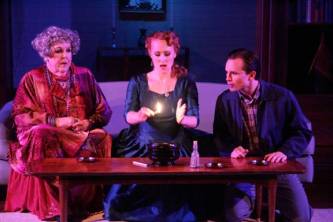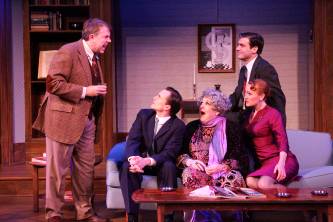
A decade and a half before Samantha “Bewitched” Darren Stephens, a gorgeous young sorceress named Gillian cast a spell over New York publisher Shep Henderson in John Van Druten’s 1950 Broadway comedy Bell, Book, And Candle, best known for its 1959 film adaptation starring James Stewart and Kim Novak. Though the original stage version made it into John Gassner’s Best American Plays series as one of 1945-1951’s seventeen best (alongside Death Of A Salesman, A Streetcar Named Desire, and Mister Roberts), Bell, Book, And Candle has pretty much disappeared from theatrical view, at least in major professional productions. That’s why its arrival at Burbank’s Colony Theater qualifies as rather an event, even more so because unlike many mid-century plays, Van Druten’s romcom holds up very well indeed, scarcely seeming sixty years of age.
Directed with flair, energy, and polish by Richard Israel in his first Colony assignment, Bell, Book, And Candle makes for two of the freshest, funniest, and downright sexiest hours of romantic comedy around town.
Willow Geer plays Gillian (both G’s are of the hard variety), whom we meet in her stylish midtown Manhattan apartment on the evening of December 24, 1953. Just returned from a trip to Mexico, Gillian feels in the mood for a special Christmas present, or so she tells her black cat Pyewacket. “I’d like to meet someone different,” she informs the feline in her arms, “like the man upstairs.” The next thing you know, there’s a knock on the door and who should be outside but Shep Henderson (Michael A. Newcomer), the handsome man in question.
Romance is the last thing on Shep’s mind, however, at least initially. He’s come to complain about Gillian’s eccentric Aunt Queenie, who keeps popping up in Shep’s apartment despite its being locked and Queenie not having a key. Then there are the “kind of dramatics” Shep can hear through his ceiling, “as if she were reciting,” the strange smells emanating from Queenie’s apartment, and the way his phone has started ringing late at night since he complained to the real estate agents about the annoyances.
When Shep learns that Gillian has recently been in Taxco, he inquires if she happened to run into a man named Sidney Redlitch, author of Magic In Mexico, whose next book Shep would like to publish. Gillian says, no, she doesn’t know Redlitch personally, but she knows people who do, and can put the two men in touch. (Actually, all it will take is a little bit of black magic.)
The arrival of Aunt Queenie (Mary Jo Catlett) is Shep’s cue to make his departure and Gillian’s to give her aunt a good chewing out about her snooping, making her swear to “stop practicing—in this house—ever.” When Queenie tells her niece that Shep is engaged to a young woman named Merle, the name reminds Gillian of “a liar and a sneak and a beau-snatcher” she used to know. Realizing that both Merles are one and the same, Queenie suggests that Gillian use her powers to snatch Shep out of Merle’s evil grasp, but Gillian has a different idea. “I’d like to see how good I am, the other way.”
There’s only one catch: A witch can never fall in love. If she does, all her powers will be lost, and Gillian is beginning to feel a different kind of witchcraft attracting her to the man upstairs.
Aside from a few 1950s references (e.g. to the Kinsey Report), about the only thing dating Bell, Book, And Candle is the absence of 21st Century technology—the Internet, cell phones, and (gasp!) even TV. Van Druten even begins the play’s second scene with Gillian and Shep stretched out on the couch, stage directions significantly indicating that “the door to the bedroom is partly open.” (Amazing how much franker the stage could be than movies of that era.) Director Israel makes the scene’s post-coital chronology more explicit by having Shep shirtless and Gillian in her slip, but the specificity is right there in the original 1950 script.
Then there’s what Redlitch has to say about witches and warlocks in New York. “Right here—all around you—there’s a whole community,” he informs Shep, Gillian, and Gillian’s warlock brother Nicky. “They have regular hangouts—cafés, bars, restaurants. [They look] like anyone else. Like you—or you—or you. [I can recognize them] like a shot. It’s something. A look. A feeling. Some of them [kind of flaunt it]. Go about dressed up so that people will recognize them.” Innocuous enough, until you recall that Van Druten was a gay man living in New York City, and realize that the underground life described by Redlitch is the one Van Druten and his fellow “warlocks” called home. Gay 1950 theatergoers must have been laughing their heads off as the double meaning whooshed over the heads of their clueless straight counterparts.
The current Colony production succeeds on so many levels, it’s hard to know which to mention first, but let’s start with the performances, pitch-perfect for the play’s mid-20th Century New York setting. A savvy Israel has his actors affect precisely the cultivated blend of American and British English that was de rigueur in films and stage plays set in Bell, Book, And Candle’s upper-class milieu. A more natural style of acting might make Van Druten’s dialog sound dated. If it doesn’t, it due greatly to the respect the Colony cast pay to the style of the era.
Geer is simply sensational as Gillian, sleek, sexy, sophisticated, and irresistible, and in fact the very same thing can be said about her onstage beau, Newcomer once again proving himself arguably L.A. theater’s premiere romantic leading man. The chemistry, both romantic and sexual, that Geer and Newcomer ignite on stage positively sizzles.
Catlett is an L.A./Hollywood treasure, and it’s a joy to see her sink her teeth into the kind of role that she was born to play, warm and wacky and utterly irresistible. Will Bradley, fresh from his triumph with The Twentieth Century Way, plays Nicky sly, sexy, and a bit dangerous (echoes of his memorable L.A. debut last January in Camelot), giving delectably subtle hints that Nicky’s “date with Natalie” may just be a cover-up for something a tad more “warlockian.” Benton Jennings completes the stellar cast terrifically as a blissfully clueless Redlitch.
As always, the Colony has assembled a team of designers who could hardly be better at recreating the look and sound of an era. Scenic designer Stephen Gifford’s gorgeous 1953 New York apartment features the decade’s straight-lined furniture, natural wood bookcases, and a very cool spiral metallic Christmas tree. Sharon McGunigle’s elegant early ‘50s costumes are for the most part so absolutely perfect, particularly Gillian’s sensational Act One number with its pencil thin mid-calf skirt and conical bodice, that a couple of later skirts look glaringly too short for the era, a minor gripe. Luke Moyer’s lights Gillian’s apartment gorgeously with mostly indoor nighttime illumination. Cricket S. Myers’ sound design situates us melodically mid-20th century with some sexy, cool jazz background tunes. MacAndME’s property design and set dressing are once again tops, the authentic, non-spiral 1950s phone cord and a very believable stuffed Pyewacket deserving special snaps. Leesa Freed is production stage manager.
I loved every minute of Bell, Book, And Candle. It’s a perfect choice for Colony subscribers, but also one that should attract and delight single-ticket theatergoers in search of classy classic comedic entertainment. It’s also a joy to see the Colony bringing back larger cast shows at the same time as other theaters are cutting back on casts and budgets. Most of the cast thank Barbara Beckley’ Colony Theatre for being “Equity Actor Friendly,” and that too is every bit as worthy of celebration as is Bell, Book, And Candle. The 1950s are surprisingly timeless in this all-around fabulous revival of a nearly forgotten gem.
Colony Theatre, 555 North Third Street, Burbank.
www.colonytheatre.org
–Steven Stanley
October 23, 2010
Photos: Michael Lamont




 Since 2007, Steven Stanley's StageSceneLA.com has spotlighted the best in Southern California theater via reviews, interviews, and its annual StageSceneLA Scenies.
Since 2007, Steven Stanley's StageSceneLA.com has spotlighted the best in Southern California theater via reviews, interviews, and its annual StageSceneLA Scenies.







 COPYRIGHT 2025 STEVEN STANLEY :: DESIGN BY
COPYRIGHT 2025 STEVEN STANLEY :: DESIGN BY